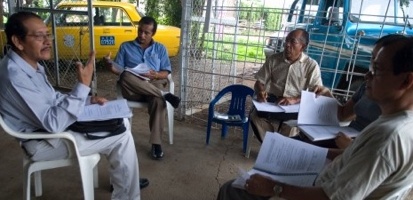Anyone for TEE?
 This report from Kristen Hiller via Guy Muse in Ecuador:
Sunlight pours through the glass ceiling of the Fundacion Clemencia, flooding the great room where a small cluster of elderly residents clap their hands and sing: “Santo, santo, santo!” or “Holy, holy, holy!”
This report from Kristen Hiller via Guy Muse in Ecuador:
Sunlight pours through the glass ceiling of the Fundacion Clemencia, flooding the great room where a small cluster of elderly residents clap their hands and sing: “Santo, santo, santo!” or “Holy, holy, holy!”
Had Jose and Adriana Salazar not taken in these abandoned elderly in Ecuador, they probably would not have gotten food, shelter, and a chance to hear the Gospel.
The Salazars have spent the past five years establishing the Fundacion Clemencia, where they minister to the neglected elderly of Guayaquil, while also balancing their own theological studies.
Since 2003, a partnership between International Mission Board missionaries, workers with Serving In Mission, and national church planters has produced the Theological Education by Extension (TEE) program allowing people like the Salazars to study theology while leading house churches.
“TEE is really filling a need that’s not being filled by the traditional seminary approach,” says Guy Muse, IMB strategy coordinator for this part of Ecuador. “Our goal, of course, is that we would like to see everybody, every single believer, trained theologically.”
As opposed to the traditional seminary approach, TEE allows students to stay in their local churches, study at their own pace, and meet each week for discussion and lecture, Muse explains.
“We don’t train and then send out,” Muse says. “We send out and then train church leaders as they actually do the work.”
The TEE curriculum is comprised of four levels of study, each taking about two years to complete. TEE enrollment averages between 70 and 100 students, who meet at various times and places throughout the week.
Those who have completed earlier levels of the program now teach others who are new to theological study.
Although Muse and other missionaries initially served as instructors in the program, TEE in Guayaquil is now led almost entirely by Ecuadorian church planters.
“As national believers completed levels, missionaries just stepped out of doing all the teaching,” he explains. For the program to continue long-term, Muse says it must be led by national teachers.
After studying in both a traditional seminary as well as the TEE program, house church leader Carlos Perez Flores says the TEE curriculum is a better match for the social and economic reality of the Ecuadorian people.
Xavier Alvarado, president of the Ecuadorian Baptist Convention, says only 20 percent of pastors in the convention have received any kind of theological training. By using the TEE program, Muse says 90 percent of those leading house churches have been trained.
Flores says that since national believers must work at secular jobs in addition to their ministry roles, TEE allows them to further their theological training while providing for their families in a secular workplace.
“If we want to reach the multitudes we need people who are able to transfer practical concepts to people’s lives,” Flores says. “We must be able to train others who also have families and work, and who also want to serve the Lord themselves.”
Muse estimates only one in 10,000 of those living in Guayaquil have the financial and social means needed to attend a traditional, live-in seminary.
“That’s not the world these people are living in,” Muse says. “We need to take theological education to them. No one’s neglecting theological education--it’s just a different way of doing it.”
Kristen's report left me wondering if anyone has adapted TEE for training church planters in the West. . .
